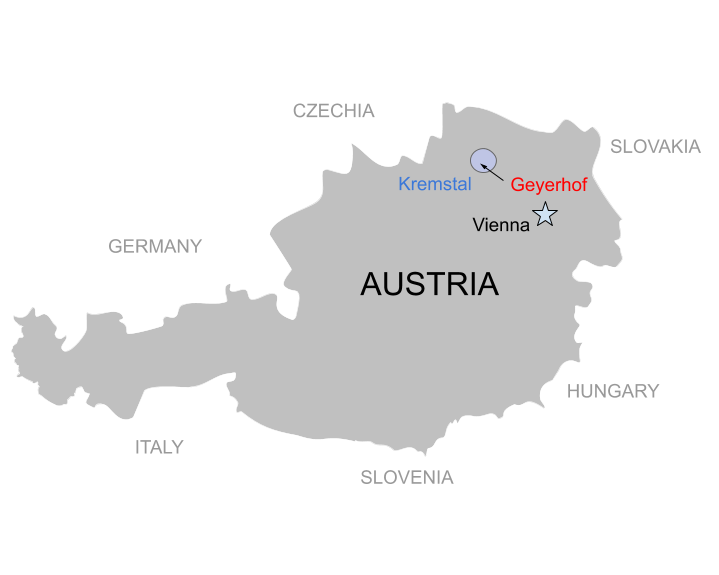2018 Geyerhof Zweigelt StockWerk
Kremstal, Austria

400 Years in wine. Ilse Maier’s mother’s family has lived in the hilltop village of Oberfucha since the 16th century where the family began in agriculture and brickworks. In the 17th century, Maria Theresia, archduchess of Austria, granted the property owner, whose name was Geyer, a concession to transport wine on the Danube in trade with Hungary and other regions along the river. The ship on the wine label refers to this trade. Today, the winery is housed in a 16th-century structure built of brick, with cellars beneath it constructed between the early 1300’s and the late 1700’s. Among these, the “French cellar” where Napoleon’s army stored their wine rations during a battle in nearby Wagram. The room’s perfect temperature and humidity make it an ideal place to archive the best of each vintage. In 1986, after studying agriculture in Vienna and spending time in San Rapael, Argentina, Ilse joined her father in wine production. Today she works in the vineyards and the cellar, aided by her son Josef to produce wines reflective of their site.
VINEYARDS
Geyerhof organically farms roughly 20 hectares located on the hillsides around the winery. Promotion of beneficial species, sowing of nitrogen-absorbing plants, use of compost and rock flour for plant nutrition, and abstaining from the use of all pesticides, insecticides, botrytis and weed control substances as well as soluble mineral fertilizer are all standard practices. Loess and alluvial soil east of the winery (Gaisberg and Rosensteig), primary rock to the northwest (Steinleithn and Kirchensteig), and loamy soil to the south (Hoher Rain). 60% of the vineyard area is planted to Grüner Veltliner, 20% to Riesling, and the balance to Zweigelt, Weissburgunder, Chardonnay, and Gelber Muskateller. Recent clonal selections came from the famous Knoll vineyards. Asked if biodynamic viticulture has ever seemed to be a next step, Ilse says she doesn’t believe it to be necessary—bio is not a “step up” from organic, just a different approach.
WINE MAKING
Fruit is handpicked and strictly sorted in the vineyard. Healthy clusters are pressed whole, and the must is intentionally oxidized in the press tray resulting in deeper flavors and greater age-ability. Wines are fermented and aged in 3,000 liter temperature controlled stainless steel tanks. The slow, even fermentation never exceeds 22 °C. A small percentage of whites and the red wine are aged in neutral oak tanks or barrels. Spontaneous fermentation is preferred, but never at the expense of quality. Malolactic fermentation is avoided in the whites. No other additions are used except for sulfur post fermentation. Wines remain on the lees until just before gentle filtration and bottling.
NOTES & PAIRINGS
The StockWerk wines pull from the younger vineyards in and around the village of Oberfucha and are usually from granite and gravel soils. These are also the cooler sites buffered by forests, grazing land for their cattle, and north-east facing. These are very much Heuriger/Buschenschank wines to us, in that they are made to have fresh with plenty of accordion and comfort foods. They are bright, happy, lower alcohol, and table wines in the best possible sense.
ANALYTICS & PRONUNCIATION
PRODUCER: Geyerhof (Geyerhof (Guy-er-hof))
APPELLATION: Kremstal (Kremstal)
VINTAGE: 2018
GRAPE COMPOSITION: 100% Zweigelt (ZZ-why-gelt)
CLIMATE: Cool Pannonian
SOILS: Deep sandy soil
EXPOSURE: Eastern
MACERATION & AGING: Stainless Steel Fermentation
ALCOHOL: 13.3%
RESIDUAL SUGAR: 0.8 g/l
ACIDITY: 5.7 g/l
